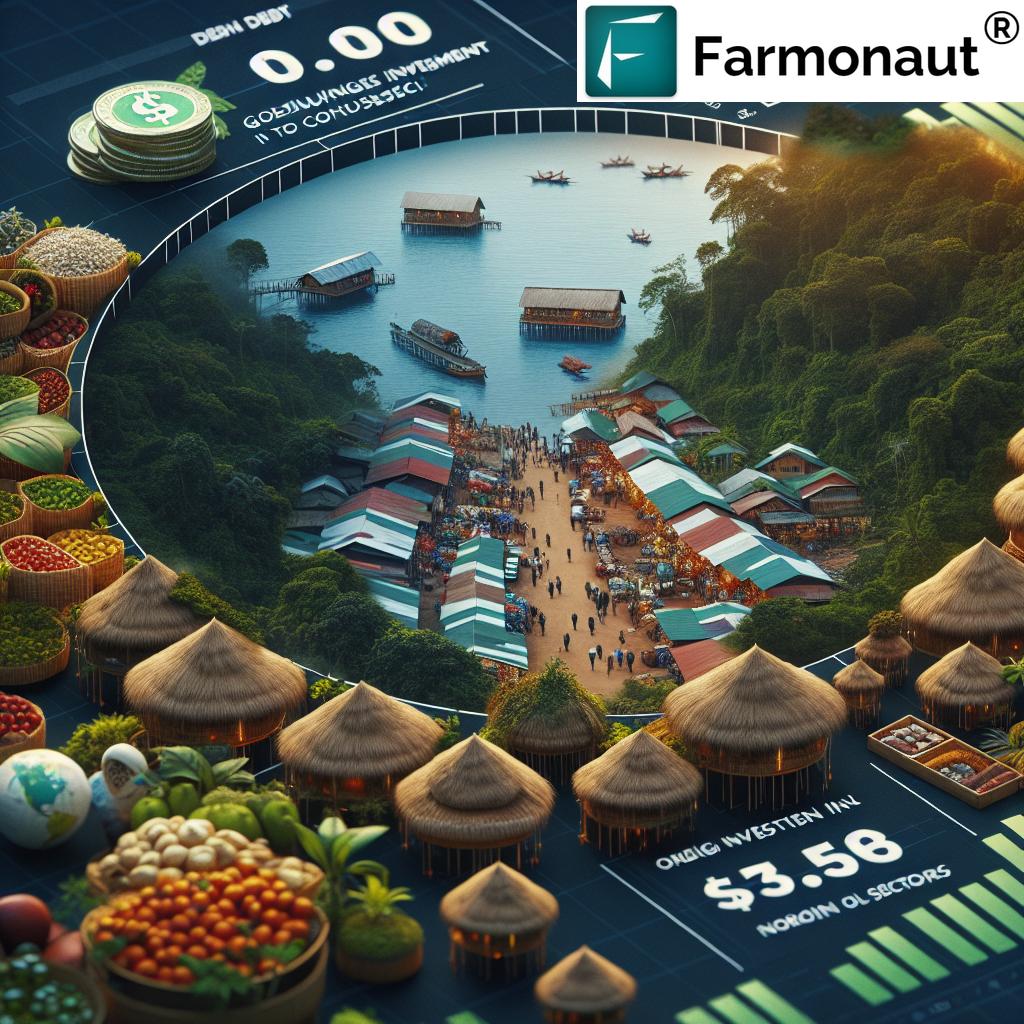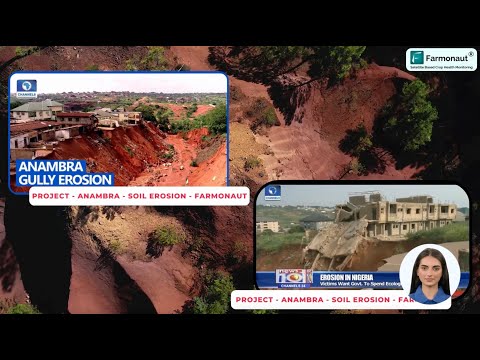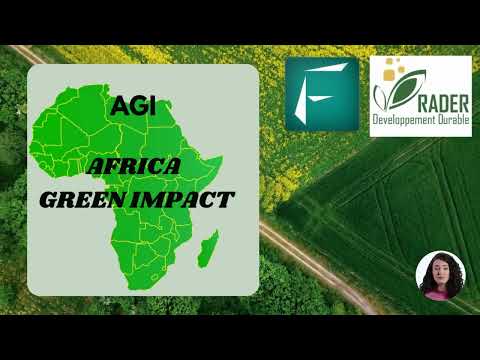Congo’s Economic Transformation: Diversifying Beyond Oil to Ease Debt and Boost Foreign Reserves
“Congo aims to reduce its debt-to-GDP ratio from 96% to 70% within five years, focusing on economic diversification.”
In the heart of Africa, a nation stands at a crucial economic crossroads. The Republic of Congo, long dependent on its oil reserves, is now embarking on an ambitious journey of economic transformation. As we delve into this pivotal moment in Congo’s history, we’ll explore the intricate balance between addressing immediate debt challenges and building a sustainable economic future through diversification and prudent financial management.

The Congo Debt Crisis: A Nation at a Crossroads
The Republic of Congo finds itself grappling with a pressing debt crisis that threatens to undermine its economic stability and future growth prospects. With a debt-to-GDP ratio soaring at 96%, the country’s finance ministry has prioritized debt reduction as a cornerstone of its economic strategy. This high level of indebtedness not only weighs heavily on the nation’s foreign reserves but also significantly impacts its ability to service existing debts and fund crucial development projects.
At the heart of this economic conundrum lies Congo’s heavy reliance on oil production. As a primary driver of the country’s economy, the oil sector has long been both a blessing and a curse. While it has provided substantial revenues, it has also exposed the nation to the volatile nature of global oil prices, creating a cycle of economic booms and busts that have contributed to the current debt crisis.
Strategies for Economic Diversification
Recognizing the risks associated with an oil-dependent economy, the Congolese government is now setting its sights on diversification strategies. Two key sectors have been identified as potential pillars for a more resilient economic future: agriculture and tourism.
- Agriculture: With vast arable lands and favorable climatic conditions, Congo has significant untapped potential in the agricultural sector. Investing in modern farming techniques, improving infrastructure, and attracting foreign investment in agriculture could not only boost food security but also create new export opportunities.
- Tourism: Congo’s rich biodiversity, including rainforests and unique wildlife, presents an opportunity to develop a sustainable tourism industry. By investing in eco-tourism initiatives and improving tourism infrastructure, the country could attract international visitors and create a new source of foreign exchange.
These diversification efforts align well with the capabilities of innovative agricultural technology companies like Farmonaut. Through its satellite-based farm management solutions, Farmonaut could play a crucial role in modernizing Congo’s agricultural sector, improving crop yields, and attracting investment in precision farming techniques.
Debt Reduction Strategies and Foreign Exchange Management
The newly appointed Finance Minister, Christian Yoka, has outlined an ambitious plan to reduce the country’s debt-to-GDP ratio from 96% to 70% within five years. This strategy involves a multi-faceted approach:
- Renegotiating Terms: The government is exploring options to renegotiate the terms of existing debts, particularly focusing on local currency debt which poses a more immediate concern.
- Refinancing Options: Seeking opportunities to refinance high-interest debts with more favorable terms to ease the burden on the national budget.
- Spending Cuts: Implementing strategic spending cuts to reduce the need for borrowing to cover current expenditures.
- Boosting Foreign Exchange Reserves: The central bank aims to increase foreign exchange reserves to cover five months of imports, up from the current two months.
“Congo’s central bank targets increasing foreign exchange reserves from covering two months of imports to five months.”
The Role of International Financial Institutions
As Congo navigates its economic challenges, engagement with international financial institutions remains a critical consideration. The government is cautiously evaluating the possibility of pursuing another loan program with the International Monetary Fund (IMF). With an existing three-year, $455 million arrangement set for final review, the outcomes of this assessment will be crucial in shaping Congo’s financial strategy moving forward.
Additionally, the country is exploring concessional loans from organizations like the World Bank, particularly for projects in sectors such as power transmission, water, and sanitation. These initiatives could have broader social implications and contribute to the overall economic development of the nation.
Challenges and Opportunities in Debt Management
Congo’s journey towards economic stability is not without its challenges. The country recently implemented a regional debt exchange, which resulted in credit rating downgrades from agencies like S&P Global Ratings and Fitch. This move highlights the delicate balance between seeking immediate relief and maintaining long-term creditworthiness in the global financial markets.
Officials are approaching debt-for-development swaps with caution, recognizing the complexity and potential risks involved in such arrangements. While these swaps could provide some relief, they require careful consideration to ensure they align with the country’s long-term economic interests.
The Impact of Global Oil Prices and Geopolitical Factors
Congo’s economic transformation strategy must also account for external factors beyond its control. Fluctuations in global oil prices continue to have a significant impact on the country’s revenues and economic stability. Geopolitical tensions, shifts in global energy policies, and the increasing focus on renewable energy sources all pose potential challenges to Congo’s oil-dependent economy.
By diversifying into sectors like agriculture and tourism, Congo aims to reduce its vulnerability to these external shocks. However, the transition will require time, investment, and strategic planning to ensure a smooth shift away from oil dependence.
Leveraging Technology for Economic Growth
In the quest for economic diversification and modernization, technology plays a crucial role. Companies like Farmonaut offer innovative solutions that could significantly benefit Congo’s agricultural sector. By utilizing satellite-based crop health monitoring and AI-driven advisory systems, Congolese farmers could optimize their yields, reduce resource wastage, and increase their competitiveness in global markets.
Furthermore, the integration of blockchain technology for supply chain traceability could enhance Congo’s agricultural exports, ensuring transparency and building trust with international buyers. This aligns well with the country’s goals of boosting non-oil exports and attracting foreign investment in the agricultural sector.
Building a Sustainable Tourism Sector
Congo’s potential for tourism development presents an exciting opportunity for economic diversification. The country’s rich biodiversity, including vast rainforests and unique wildlife, could attract eco-tourists from around the world. However, realizing this potential requires significant investment in infrastructure, conservation efforts, and marketing strategies.
By developing a sustainable tourism industry, Congo could create new jobs, attract foreign currency, and promote conservation efforts. This sector could also provide opportunities for local communities, fostering inclusive economic growth and reducing dependence on extractive industries.
The Role of Foreign Investment in Congo’s Economic Transformation
Attracting foreign investment is crucial for Congo’s economic diversification efforts. The government is working on improving the business environment, streamlining regulations, and offering incentives to foreign investors, particularly in priority sectors like agriculture and tourism.
Foreign investment can bring not only capital but also technology transfer and expertise, which are essential for modernizing Congo’s economy. By creating a favorable investment climate, the country can tap into global markets and accelerate its economic transformation.

Enhancing Financial Management and Transparency
To restore confidence in Congo’s creditworthiness and attract investment, enhancing financial management and transparency is paramount. The government is implementing measures to improve fiscal discipline, strengthen public financial management systems, and increase transparency in revenue collection and expenditure.
These efforts are crucial not only for managing the current debt crisis but also for building a foundation for sustainable economic growth. By demonstrating fiscal responsibility and transparency, Congo can improve its standing with international creditors and investors.
The Path Forward: Balancing Short-term Relief and Long-term Growth
As Congo navigates its economic challenges, the government must strike a delicate balance between addressing immediate debt concerns and investing in long-term economic growth. This requires careful prioritization of spending, strategic investments in key sectors, and a commitment to fiscal discipline.
The success of Congo’s economic transformation will depend on several factors:
- Effective implementation of diversification strategies in agriculture and tourism
- Prudent debt management and successful negotiations with creditors
- Attracting foreign investment in non-oil sectors
- Improving governance and transparency in financial management
- Adapting to global trends in energy markets and climate policy
Economic Indicators Comparison
| Indicator | Current Value | Target Value | Timeline |
|---|---|---|---|
| Debt-to-GDP Ratio | 96% | 70% | 5 years |
| Foreign Exchange Reserves (months of import coverage) | 2 months | 5 months | Not specified |
| Oil Dependence (% of GDP) | Estimated 60% | Reduce significantly | Long-term goal |
| Agricultural Sector Contribution (% of GDP) | Estimated 10% | Increase substantially | Medium to long-term |
| Tourism Sector Contribution (% of GDP) | Estimated 2% | Significant increase | Long-term goal |
Conclusion: A Pivotal Moment for Congo’s Economy
The Republic of Congo stands at a critical juncture in its economic history. The challenges are significant, but so are the opportunities for transformation. By diversifying its economy, managing its debt prudently, and leveraging technological innovations, Congo has the potential to build a more resilient and prosperous future.
As the country moves forward, the support of international partners, the commitment of its leadership, and the resilience of its people will be crucial in realizing this vision of economic transformation. The journey ahead is complex, but with strategic planning and decisive action, Congo can navigate its way towards a more stable and diversified economy.
FAQ Section
- Q: What is the current debt-to-GDP ratio of Congo, and what is the target?
A: The current debt-to-GDP ratio is 96%, and the government aims to reduce it to 70% within five years. - Q: How is Congo planning to diversify its economy?
A: Congo is focusing on developing its agriculture and tourism sectors to reduce dependence on oil revenues. - Q: What role do international financial institutions play in Congo’s economic strategy?
A: Congo is considering engaging with institutions like the IMF and World Bank for loan programs and concessional loans, particularly for infrastructure projects. - Q: How is Congo addressing its foreign exchange reserves issue?
A: The central bank aims to increase foreign exchange reserves from covering two months of imports to five months. - Q: What challenges does Congo face in its economic transformation?
A: Key challenges include managing high debt levels, reducing oil dependence, attracting foreign investment, and improving financial transparency.
Earn With Farmonaut: Affiliate Program
Earn 20% recurring commission with Farmonaut’s affiliate program by sharing your promo code and helping farmers save 10%. Onboard 10 Elite farmers monthly to earn a minimum of $148,000 annually—start now and grow your income!








